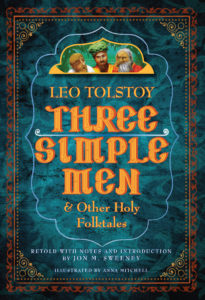
[quote_box_right]
‘Three simple men and other holy folktales’
Editor: Jon M. Sweeney
Publisher: Paraclete Press
Length: 80 pages
Release Date: July 1, 2015
Website: paracletepress.com
[/quote_box_right]
[dropcap]D[/dropcap]espite being a person of faith, deeply involved in Church life and a sinner ever seeking God’s mercy, I was raised in a scientific-thinking household. My father was a research biologist and this kind of thinking pervaded our lives, but never at the expense of faith.
One thing we children learned was that knowledge was available from everywhere, not just from empirical science, as postmodern scientists would have us believe. We have many kinds of knowledge — spiritual, emotional, psychological, etc., to help us find the objective truth, if only we have eyes to see and ears to hear.
This month I came across a fascinating book: “Three simple men and other holy folktales” by Leo Tolstoy, retold with notes and an introduction by Jon M. Sweeney. This small but ornate book — it even smells ornate — explores three of Tolstoy’s preserved Russian folktales: “Three simple men,” “A godson learns to fight evil” and “One neglected spark may burn down a house,” each one packed with the treasure of truth uniquely delivered through literature. We all know of Leo Tolstoy and his “War and Peace,” “Anna Karenina” and “The Brothers Karamazov.”
Sweeney’s small book gives us a chance to sample Tolstoy at his finest without investing the better part of a year to do it. Sweeney is quick to point out that while storytelling is not, in and of itself, sacramental, it most often acts as the vessel by which faith is transmitted. The Bible is a whole library of literary works inspired by God.
In the first story, “Three simple men,” Tolstoy tells the tale of a basket-maker, a food-gatherer and a thinker living in utter harmony on an isolated island, praising God and using their unique skills for the service of each other. One day, two priests on a ship drop by. The priests immediately assume that these men know nothing of the Lord, and they try to teach the men the Lord’s Prayer but the men are unable to learn it properly. The three men use only one prayer: “we are three, praise to thee, have mercy on us.”

The priests leave on their ship, saddened that they couldn’t “save” the three men, when miraculously, the trio follows after the ship riding on a big wave. The priests are astounded when the men arrive on deck and ask to try again to learn the Lord’s Prayer. The priests can only reply that the men’s own simple prayer is certainly grand enough saying, “we are five, praise to thee, have mercy on us.”
In the second story, “A godson learns to fight evil,” we have a godson — about 18 — and an elusive godfather who he finally meets. The godfather presents the young man with a test, a door that he is not supposed to open but, of course, he does, and inside saves a person by killing the bad guy thereby committing an act of evil. The young man flees into the forest, finds a hermit who teaches forgiveness and who then directs the boy to cut down an old apple tree, separate the trunk into three logs, burn them, and then plant the stumps, watering them every day. The next day, the hermit dies leaving the boy in his place. The young man accepts his new position as penance.
A highway robber confronts the young hermit who tries, as he should, to steer the man away from his evil ways, but the robber does not listen and tells the young man if he sees him again, he will kill him. The robber confronts him again, the young man tries to steer and the robber again refuses to listen, but the robber does not kill the young hermit. Thus, the robber slowly evolves with each meeting to move away from evil and the young hermit comes to understand.
In the third story, “One neglected spark may burn down a house,” a long-standing, neighborly relationship between two families crumbles over one lost egg. Relations continue to deteriorate until the head of each family starts a fire to burn down the other’s house but ends up burning down the entire village.
Each of these stories is packed with Christian teaching in a way only great writers can do, a way we rarely read about in today’s culture where almost all values are denigrated.
This is one of those books that you should buy repeatedly, for Christmas, for birthdays, for Easter, and for the heck of it. An immensely great read.






